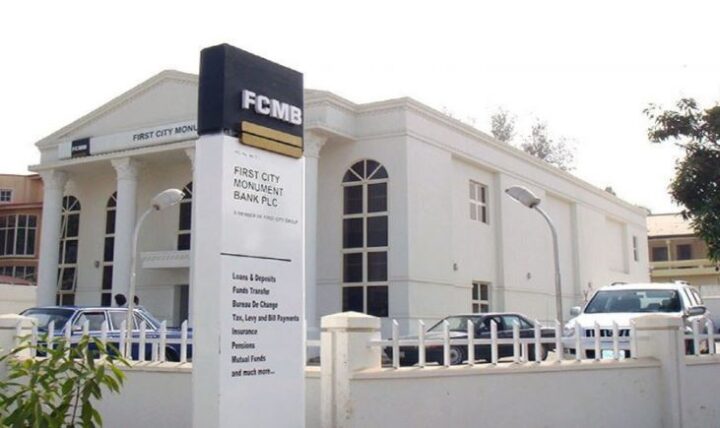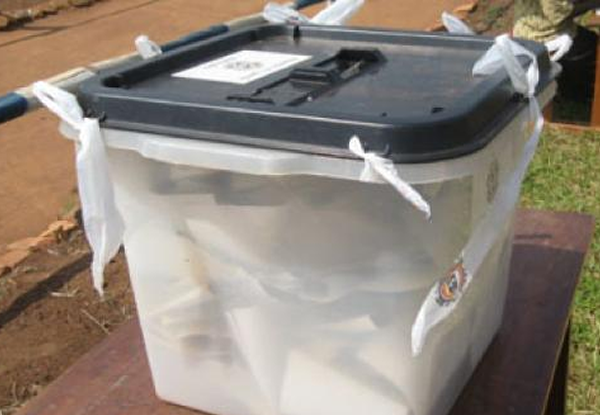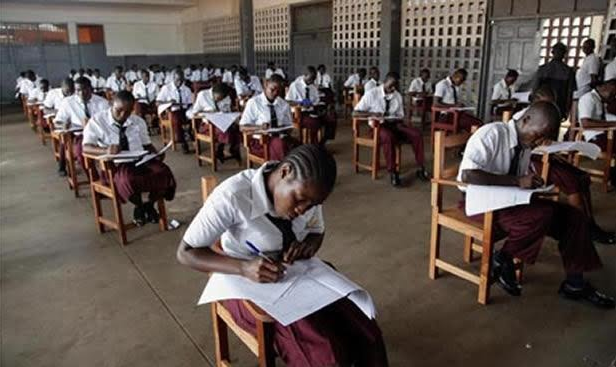At 10:15am on August 5, Idowu Joshua, an SS3 student of Ladigbolu Grammar School, Oyo, sat quietly in the corner of a classroom. His separation from other members of the class was not borne out of the intention to maintain social distancing as prescribed by the Nigeria Centre for Disease Control (NCDC) to curb the spread of COVID-19. Despite wearing a cardigan, Joshua was shivering; he was also running high temperature.
The poor condition of his classroom windows, coupled with his school uniform, made up of a shirt and shorts, exposed him to the cool morning breeze. A few minutes later, Joshua rushed out to the corridor, squatted sharply and vomited in front of the classroom.
After releasing the contents of his stomach, Joshua was faced with the challenge of getting water to clean himself. “Water ooo… bring water,” Akolade Mohammed, one of Joshua’s friends, shouted. The taps were not running so his classmates had to race to the school gate to get the water meant for people entering the school to wash their hands as part of prevention measures against the spread of COVID-19.
Joshua was cleaned up and taken back to the classroom with the help of his classmates. There was no teacher or any member of the school’s management team around to attend to him; Joshua was not isolated from the rest of the students and zero protocol was observed.
Advertisement
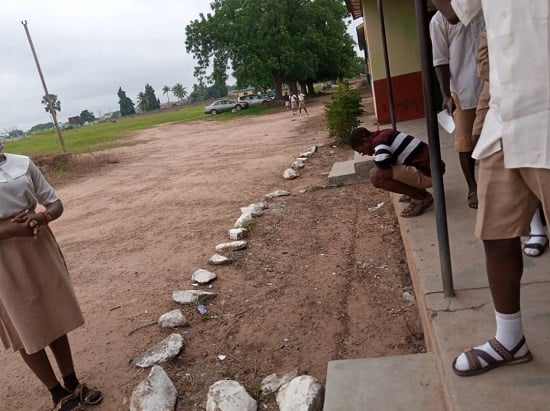
“I have been sick since last week. I am very sick, but there is no clinic in the school,” he said.
This is the situation in some schools in Oyo state, where students are faced with the challenge of running water and absence of medical facilities. Out of the six public schools visited across the state, only one had a clinic, which was locked at the time of visit – during school hours.
The NCDC, in its guidelines for school reopening, directed that schools should “establish and adequately equip dispensaries and clinics as appropriate”. It further states that the government should “ensure that school clinics are ready to attend to sick people”. But the reality is different in Oyo state.
Pelumi Oyeniran, an SS3 student in Ajibode Grammar School, Ibadan, said no health facility has been built since she enrolled in the school six years ago.
Advertisement
“I have never heard of a clinic established in this school since I joined. When you are sick you go home,” she said.
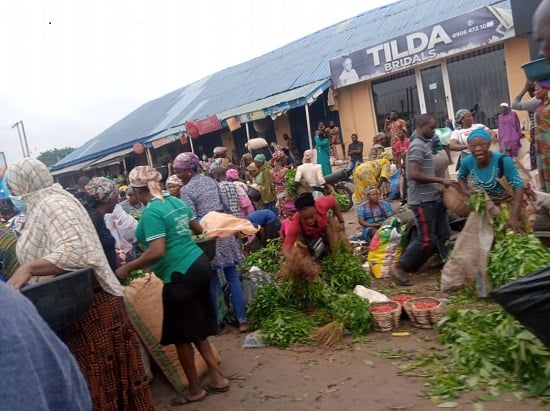
When TheCable reporter arrived at Iwo road area of Ibadan, it was difficult to tell if residents were aware of the rising number of COVID-19 cases in the state. For several weeks, Oyo maintained its position as the third most infected COVID-19 state in Nigeria — after Lagos and the federal capital territory (FCT). However, it appears most residents are oblivious to this fact as they throw caution to the wind, refusing to comply with the guidelines for preventing spread.
A visit to several parts of the state including Bodija market in Ibadan showed large gatherings of persons in violation of guidelines provided by the NCDC. Buyers and sellers in the market bumped into one another with reckless abandon, just as buses and taxis were still crowded.
LACK OF ACCESS TO WATER
Advertisement
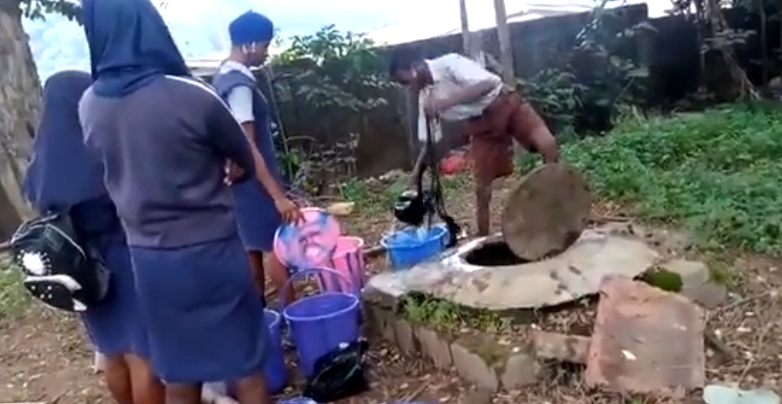
There were reports of increased COVID-19 cases after schools reopened in some countries. On July 13, Ghana announced that 55 persons tested positive among students and staff members of Accra Girls Senior High School after schools reopened partially in June. In the same month, the South African government ordered the shutdown of public schools after the country recorded a spike in COVID-19 cases.
In July, Seyi Makinde, governor of Oyo, had cancelled the third term for all classes and ordered the resumption of pupils and students in graduating classes. But since resumption, some schools have approached the guidelines with laxity as health facilities, good toilets, access to running water, among others, are difficult to find. Some of the students interviewed said because of poor conditions of the toilets in their schools, they practise open defecation.
“We do our poos in the bush; same as urine because the toilet is under lock. We don’t have running water here. The only water available is the one there,” Amina Ismail, a student of Ajibode Grammar school, said while pointing to a well dug a few metres from the classrooms.
“Before, the tap used to run like twice in a week, but now it is not even functioning at all. We don’t have toilets, we used to go inside the jungle (referring to the bush within the school premises) to pass out waste. We wash our legs in school two (the junior school at the other end of the school premises),” Mohammed Baki, a student of Ladigbolu Grammar School, said.
Advertisement
Raji Ishola, another student, said the school does not have a medical centre or isolation spaces as required by the NCDC.
“We don’t have a medical centre here. We are asked to go home when we are sick,” he said.
Advertisement
On temperature checks, this reporter observed that schools carry out screening between 7am and 8:30am. Other students, staff and visitors entering the school premises after that time are not checked as the thermometer is usually taken to the principal’s office where it lies on the table till the next morning. This was the case at the office of Akindele Samuel, principal of Ladigbolu Grammar School.
The students interviewed narrated how difficult it has been to comply with the new rules on handwashing, wearing of face masks, among others.
Advertisement
“I don’t feel free using the face masks; it is difficult,” Adewunmi Elizabeth, a student of St. Louis Grammar School, Mokola, Ibadan, said.
“We haven’t been doing this before. Before, we mix with our friends but now they don’t allow us to do so again or buy something outside. Those that sell food don’t even come, so we fast whenever we are in school,” Adetule Precious, another student, said.
Advertisement
‘WASSCE INSPIRES US TO DARE THE PANDEMIC’
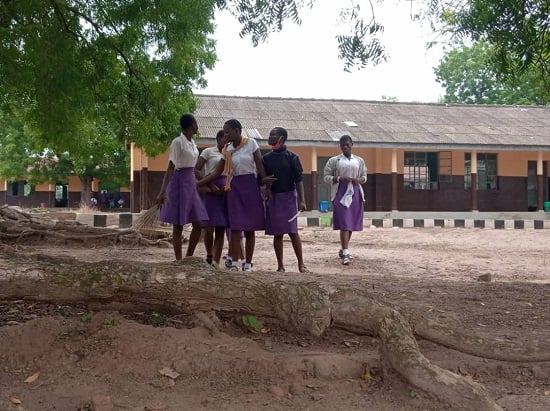
But for COVID-19, students who are currently in terminal classes ought to have progressed in their academic pursuit. Ordinarily, the West African Senior Secondary Certificate Examination (WASSCE) conducted by the West African Examinations Council (WAEC) should have held between May and June, but many countries were in lockdown during the period due to the virus. With the partial reopening of schools in Oyo state, students maintained that although their safety is important, writing the WASSCE is of greater importance.
Some students who claimed to be asthmatic explained that wearing of face masks would not help their health condition.
“I feel at risk and wearing a face mask doesn’t go well with my health,” Adedotun Adeyemi, a student of St. Olivet Grammar School, Oyo, said.
Many schools provided handwashing points but some were not at the entry point of classrooms as required. Also, some of the students preferred to keep their face masks in their pockets or bags until they were compelled by a teacher to put them on. Some of the teachers were seen without face masks and those who had it below their chins. This was the case at St. Bernard Girls School in Oyo town, where students and teachers were seen with face masks guarding their chins, while some had no face masks on.
However, some teachers, vice-principals and principals who spoke with this reporter said deliberate efforts are made to implement COVID-19 guidelines in schools. Bamgbose Ismail, a teacher at Immanuel Grammar School, Orita UI, Ibadan, said students have been using their face masks while those who don’t are compelled to do so by the teachers.
SCHOOLS OBSERVE SOCIAL DISTANCING
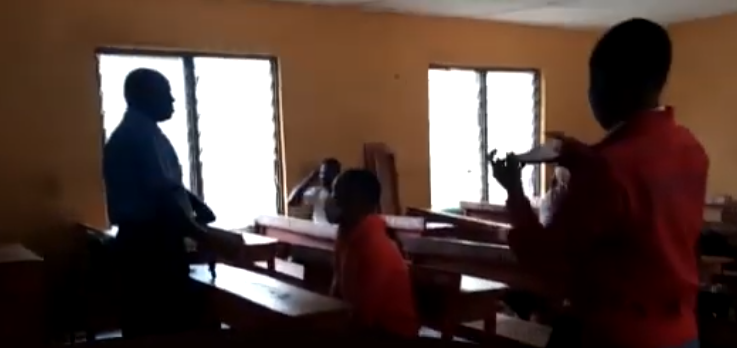
On classroom arrangement, there has been significant progress in terms of teacher-student ratio. The classrooms have smaller number of students while the number of subjects offered per day has also reduced.
“We now have between 25 and 30 students in a class,” Adepoju Isaac, a vice-principal at Immanuel Grammar School, said.
“We had to distribute students to ensure physical distancing. Before the pandemic, we had 60 in a class, but now we have 20 students in a class,” Ayeni Modupe, another vice-principal in St. Louis Grammar School, said.
“Since we observe the rule, we don’t feel endangered. Moreover, we only have SSS 3 students who are 482 in number and we have many classrooms. We don’t feel threatened,” Alabi Adeolu, St. Olivet head of staff for SSS 2 class, added.
Some teachers, however, faulted poor compliance by the school management to curb the spread of the virus. A teacher in St. Loius said “temperature check is not so complied with here, but students are safe in school. We don’t allow them to stay together. They don’t even share biro, pencil because we have warned them.”
GOVERNMENT: WE’LL PUT STRICTURES IN PLACE

When TheCable contacted Victor Olojede, the special adviser on students’ affairs to the governor of Oyo, he said the state government is working towards putting several structures in place.
“We had a risk management plan to look at the risk of resumption and we discovered it was feasible for us to resume. We trained teachers and school owners at the local government level and they were trained by the COVID-19 team on how to arrange the school, classes, etc. We also have a team to look at compliance with COVID-19 rules. The team is made of the local and zonal inspectors, ministry of education, etc,” he said.
“In Oyo state, one of the reasons you can see a lot of people who have tested positive for the virus is because we have more of the community-based testing. In Nigeria we are one of the top states doing so much on community-based testing.
“While we believe the government is a continuum, past administration did not do well regarding some of these schools. But I can assure you it is one of the things in the budget. We are trying to see that our schools in Oyo state are modern and better schools. We are already looking into issues of school structures, water, among others, so all these things are being worked on.”
Meanwhile, speaking at an online townhall monitored by TheCable and organised by STEM Education Development Foundation, a non-governmental organisation committed to quality education in Oyo on July 30, Olasunkanmi Olaleye, the state commissioner for education, science and technology, said compliance with COVID-19 guidelines in schools across the state is nearly 100 percent.
“We appointed an incident manager for each school and a class warder for each class. The job of the incident manager is to ensure that all the protocols of COVI-19 in the school are observed. We have intensified monitoring of schools to ensure that all the COVID-19 guidelines are being observed in Oyo state. During the monitoring, we have seen almost 100 percent compliance in schools,” he said.
NMA: SCHOOLS REOPENING WILL ENDANGER STUDENTS, TEACHERS
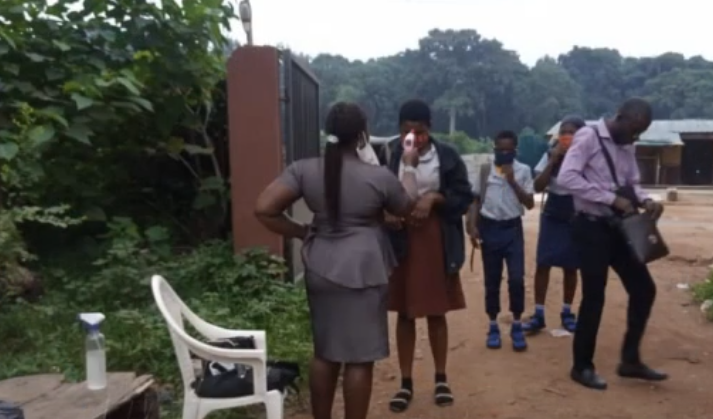
Akinloye Shodipo, chairman of NMA chapter in Oyo, said several conditions are yet to be met to curb the spread of COVID-19 in the state, and warned that “if the parameters are not put in place a spike in cases will happen”.
“The position of NMA in Oyo state is that the schools might have to be reopened but under caution and strict guidelines. The NMA believes the guidelines have not been met, so opening it in a hurry is a two-edged sword,” he said in a statement.
“Most of the schools don’t have sick bay and the government is not doing anything about it. Once a child is sick, they ought to first isolate the child before someone comes to take him. But most of them don’t have sick bays and it is worrisome. Some of these schools don’t even have a medical attendant or someone who can attend to a sick student. From what is on the ground, students and teachers are endangered.”
From the findings by TheCable, the Oyo state government needs to improve the provision of facilities in the state, and ensure strict compliance with COVID-19 guidelines in schools. Also, better enforcement is needed in other parts of the state as the students and teachers often end up joining the crowded buses and markets, thereby endangering them further.
This is a special investigative project by Cable Newspaper Journalism Foundation (CNJF) in partnership with TheCable, supported by the Open Society for West Africa Initiative (OSIWA). Published materials are not views of OSIWA.
Add a comment
